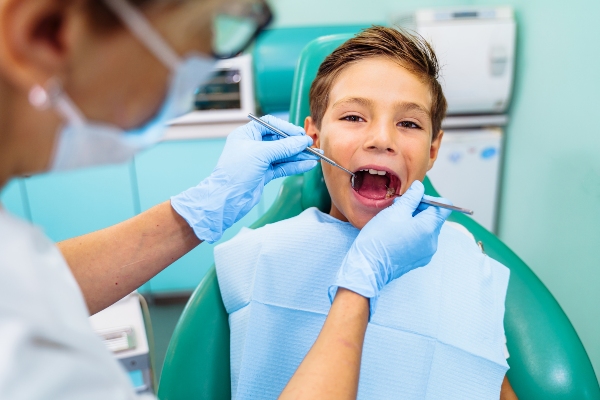 When your child has a dental emergency, a visit to a pediatric dentistry office is likely necessary. Most pediatric offices are well equipped to handle serious dental injuries. In fact, taking your child to see their regular dentist can be very beneficial. Your child can feel more at ease than they would in a new environment, and the staff will be more up to speed with your child's dental health and specific needs.
When your child has a dental emergency, a visit to a pediatric dentistry office is likely necessary. Most pediatric offices are well equipped to handle serious dental injuries. In fact, taking your child to see their regular dentist can be very beneficial. Your child can feel more at ease than they would in a new environment, and the staff will be more up to speed with your child's dental health and specific needs.
Common dental emergencies in children
Tooth and gum injuries are relatively common, especially in active children. Some situations can wait a day or two for treatment, while others require more prompt attention.
Knocked-out teeth
When your child loses a permanent tooth, time is of the essence. Preserve the tooth by placing it in a cup of milk or, if your child is old enough, have them carefully hold it in their mouth inside their cheek. This will prevent the inner tissues from dying. If a pediatric dentistry professional can see your child within an hour or so, there is a decent chance that a preserved tooth can be reinserted and saved.
Prematurely lost baby teeth may not need to be saved, but it is still important to have a dentist check for remnants and potential injuries below the surface. The dentist may fit your child for a spacer or partial denture to wear until the permanent tooth is ready to erupt, preventing alignment, speech, and digestive issues in the meantime.
Chips and cracks
Teeth with minor chips or cracks may be able to wait a few days for treatment, but any damage that exposes the softer tissues or roots requires immediate treatment. These injuries can quickly cause decay and infection, not to mention severe pain. If possible, a chipped or cracked tooth may be treated with dental bonding to fill in the gaps and reconstruct lost tissue. If the damage is severe, a dental crown may be needed instead.
Severe oral pain
If your child is complaining of sudden, severe, or chronic tooth pain, they should see a dentist promptly. Your child may be dealing with severe tooth decay that could lead to an infection. Fillings are the most common type of treatment for cavities, but if the decay has spread enough to weaken the overall structure of the tooth, a dental crown may be used instead.
Signs of infection
Dental infections should be taken very seriously. Over time, they can spread and enter the bloodstream, leading to a serious and even life-threatening condition known as sepsis. If your child develops any of these symptoms, they should be evaluated by a dentist as soon as possible:
- Severe or intense oral pain
- Swelling
- Redness
- Oozing or drainage
- Heat at the site
- The formation of a bubble along the gum line
- A fever that accompanies any of the above symptoms
Draining of the infection site, antibiotics, and tooth extraction are all possible treatments.
Conclusion
In the event of a dental emergency, contact your child's pediatric dentistry office right away. They can offer guidance and will likely be able to see and treat your child.
Request an appointment or call Hudson Valley Pediatric Dentistry at 845-363-4177 for an appointment in our Middletown office.
Recent Posts
A child dentist can help your child achieve better dental and general health. Regular visits allow your child to get used to dental checks, tools, and equipment. Dental fear disappears, and the young patient can continue having a bright, painless smile. Here are what parents like you should look forward to during child dentist appointments.Choosing…
Cavity treatment for kids is essential for a child’s oral health. Dental decay can cause discomfort, causing the child to lose focus at school. It can even result in low self-esteem and malnutrition. Treating cavities can improve your child’s general health. Here are effective techniques for cavity treatment for kids.There are cases when fillings cannot…
Parents play a crucial role in their children's tooth care by ensuring their children get started on the right path to optimal dental health. This involves overseeing children's tooth care at home while also helping them develop healthy dental habits and ensuring they see a pediatric dentist regularly.Parents will need to keep their child's mouth…


